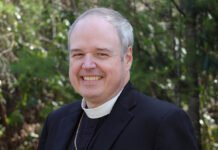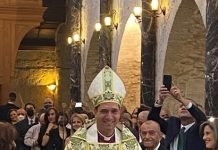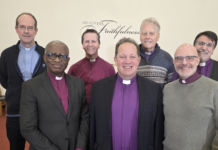Mae’r neges hon hefyd ar gael yn Gymraeg (gweler isod)
Most, if not all, of us might wish to live in world where everything is certain, everything is predictable and everything is controllable. We’d know where we are. Of course, as recent events make crystal clear, it’s wishful thinking rather than reality to expect such things.
Just when we thought, whatever our political views, that the result of the General Election in December 2019 would mean that the seemingly endless political writhing and posturing around the Brexit event would soon be over, came both the warning and then the reality of devastating storms which wrecked lives, homes, livelihoods and hopes. And then, and still now and for a good deal of the foreseeable future it seems, Coronavirus sweeps much of the world, leaving it, in many places, in lockdown, a pattern of life imposed upon us, for our good and the good of others, the like of which few have ever before experienced. A cloud of sickness and distress hangs over many nations, communities and families; precious lives have been lost, healthcare and other services are reaching breaking point, and an entire way of life, thought to be unassailable is in tatters. Fears for the future, personal, economic and national abound., and loneliness, isolation and anxiety are characteristics of the lives of millions across the world and in our local communities.
But there, in the very heart of it, amidst all the mess and worry and suffering and inconvenience and darkness, are love and light; love and light which nothing can extinguish; love and light shown willingly, gladly, and sacrificially in countless acts of goodness, kindness, gentleness and generosity, shown by millions of people unwilling to see their fellow human beings, their brothers and sisters, suffer a moment’s more pain and sorrow if they can help it. They demonstrate the things of the Kingdom of God, things which lie at the very heart of the Gospel of Jesus Christ, and which echo the Old Testament prophets’ call for justice and peace.
The crucifixion of Jesus Christ was thought by those who worked and plotted to achieve it to bring an end to what he stood for, an end to what he demonstrated, and an end to the kind of life that he said everyone had a right to experience, and for which others had a responsibility to work. This is life, in an evidently frail and fragile world, that is, nevertheless, as full and as just as it can possibly be, life in a world where even the least of those, Christ’s brothers and sisters in the flesh and blood of humanity count, matter and are treated with justice and with dignity.
Jesus’s demands for that justice and dignity for others challenged and interfered with the selfish hopes and controlling habits of others – the powerful, the manipulative, the arrogant. Their darkness despised his light; their oppression was threatened by his love. So, he had to go; put to death in front of a baying, mocking crowd, on a rubbish dump outside the walls of their carefully controlled city.
For those who had seen in him such great hopes of a new and just order, a bitter blow; the old order still in place. But as history, history not fairy tale, tells us, something more was to come, that showed, after all, that this old order was not for ever. Jesus lived. Jesus lives. The reign of love wasn’t and isn’t quite so easily put aside.
Easter is about facing down the darkness, seeking to call a halt to the pain, and pouring God’s unstoppable love into the lives of the hurting and vulnerable. All around us now just that is happening at the hands of those who are paid to do it and those volunteers who simply can’t stand by and see others suffer; and it happens time and time again whenever disaster strikes, whenever darkness comes and whenever fear threatens.
This Easter is unlike any I have known, unlike any most of you will have known. But at its heart is the truth that all generations have known, when hearts bleed, love steps in.
If your heart is bleeding, if you are hurting, if you feel threatened, alone or anxious, I hope that you find assurance in the promise that countless people in countless different ways will always believe in you, will always care about you and will always know that you matter. And they are working to bring resurrection to you now. God the Father, who sent Jesus that we might know the reality of his love, is using them to reassure you of this love for you. Here is a certainty and here is a prediction upon which we can rely and which we can trust, even if the days are dark and hearts are heavy.
Archbishop John Davies
The Church in Wales




The meaning of the atonement and the meaning of Jesus’ resurrection, along with the need for repentance and faith, don’t seem to rate much mention here.